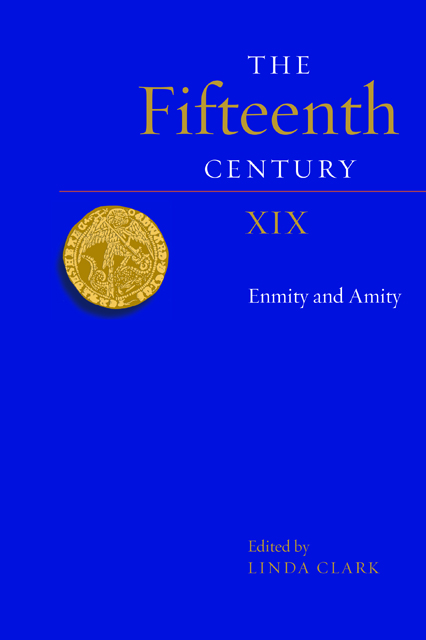Book contents
- Frontmatter
- Contents
- List of Contributors
- Preface
- List of Abbreviations
- England and Europe, c.1450–1520: Nostalgia or New Opportunities?
- Mariners and Marauders: A Case Study of Fowey during the Hundred Years’ War, c.1400–c.1453
- Henry V’s Army of 1417
- ‘Get out of our land, Englishmen’. French Reactions to the English Invasion of 1512–13
- Encountering the ‘Duche’ in Margery Kempe’s Lynn
- ‘C’est le Beaulté de Castille et d’Espaigne, qui le Soleil cler d’Austrice accompaigne’: Jean Molinet makes the Habsburgs Burgundian
- Magna Carta in the Late Middle Ages, c.1320–c.1520
- The Business of the Southern Convocation in 1462
- Index
- Contents of Previous Volumes
Mariners and Marauders: A Case Study of Fowey during the Hundred Years’ War, c.1400–c.1453
Published online by Cambridge University Press: 20 December 2022
- Frontmatter
- Contents
- List of Contributors
- Preface
- List of Abbreviations
- England and Europe, c.1450–1520: Nostalgia or New Opportunities?
- Mariners and Marauders: A Case Study of Fowey during the Hundred Years’ War, c.1400–c.1453
- Henry V’s Army of 1417
- ‘Get out of our land, Englishmen’. French Reactions to the English Invasion of 1512–13
- Encountering the ‘Duche’ in Margery Kempe’s Lynn
- ‘C’est le Beaulté de Castille et d’Espaigne, qui le Soleil cler d’Austrice accompaigne’: Jean Molinet makes the Habsburgs Burgundian
- Magna Carta in the Late Middle Ages, c.1320–c.1520
- The Business of the Southern Convocation in 1462
- Index
- Contents of Previous Volumes
Summary
Everyone knows that the Hundred Years’ War was fought chiefly in France. After all, it was the king of England’s claim to the French throne that formed one of the defining features of the long conflict. Yet despite this truism, there can be equally little doubt that the war exercised great influence on England, with the ports of the south coast in particular holding a place on the frontline. Since contemporaries characterised fighting at sea as ‘bloody and murderous’, however, it is perhaps unsurprising that the naval aspects of the conflict have received comparatively little attention from contemporaries and historians alike. Efforts by James Sherborne and Colin Richmond to redress this state of affairs have more recently been bolstered by Maryanne Kowaleski, Ian Friel, Nicholas Rodger, Susan Rose, and others. In his monograph, Craig Lambert has given us a particularly full account of naval logistics in this period. While the naval service of several English port towns has also been studied, it is fair to say that the fourteenth century, with its richer records, forms the focus of most of this scholarship.
As technological limitations resulted in naval squadrons only enjoying ‘a measure of local control for the limited time and limited area of their operation’, confining our attention to the king’s fleets presents a by no means complete picture of the war at sea. The maritime lands of the realm were often left on the frontline, with the result that portside defences were of paramount importance to both the inhabitants of these areas and the crown itself. At the same time as local and national efforts sought to raise formal fleets and secure coastal defences, a great many ‘pirates’ were to be found roving the Channel in search of their prey. Although scholars from Charles Kingsford through to C.J. Ford have considered maritime predation, the degree to which direct action at sea formed part of the war effort remains debated. A detailed study of one port, Fowey, in Cornwall, can serve as an entrée to all these aspects of maritime warfare. Fowey’s experience of the fourteenth-century phase of the war has been considered elsewhere; the present study examines the effects of the conflict through the half-century from 1400.
- Type
- Chapter
- Information
- The Fifteenth Century XIXEnmity and Amity, pp. 16 - 34Publisher: Boydell & BrewerPrint publication year: 2022



